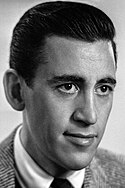J.D. Salinger Quote
…he is invariably a kind of super-size but unmistakably ‘classical’ neurotic, an aberrant who only occasionally, and never deeply, wishes to surrender his aberration; or, in English, a Sick Man who not at all seldom, though he’s reported to childishly deny it, gives out terrible cries of pain, as if he would wholeheartedly let go of both his art and soul to experience what passes in other people for wellness, and yet (the rumor continues) when his unsalutary-looking little room is broken into and someone - not infrequently, at that, someone who actually loves him - passionately asks him where the pain is, he either declines or seems unable to discuss it an any constructive critical length, and in the morning, when even great poets and painters presumably feel a bit more chipper than usual, he looks more perversely determined than ever to see his sickness run its course, as though by the light of another, presumably working day he had remembered that all men, the healthy ones included, eventually die, but that he, lucky man, is at least being done in by the most stimulating companion, disease or no, he has ever known.
…he is invariably a kind of super-size but unmistakably ‘classical’ neurotic, an aberrant who only occasionally, and never deeply, wishes to surrender his aberration; or, in English, a Sick Man who not at all seldom, though he’s reported to childishly deny it, gives out terrible cries of pain, as if he would wholeheartedly let go of both his art and soul to experience what passes in other people for wellness, and yet (the rumor continues) when his unsalutary-looking little room is broken into and someone - not infrequently, at that, someone who actually loves him - passionately asks him where the pain is, he either declines or seems unable to discuss it an any constructive critical length, and in the morning, when even great poets and painters presumably feel a bit more chipper than usual, he looks more perversely determined than ever to see his sickness run its course, as though by the light of another, presumably working day he had remembered that all men, the healthy ones included, eventually die, but that he, lucky man, is at least being done in by the most stimulating companion, disease or no, he has ever known.
Related Quotes
About J.D. Salinger
The Catcher in the Rye (1951) was an immediate popular success; Salinger's depiction of adolescent alienation and loss of innocence was influential, especially among adolescent readers. The novel was widely read and controversial, and its success led to public attention and scrutiny. Salinger became reclusive, publishing less frequently. He followed Catcher with a short story collection, Nine Stories (1953); Franny and Zooey (1961), a volume containing a novella and a short story; and a volume containing two novellas, Raise High the Roof Beam, Carpenters and Seymour: An Introduction (1963). Salinger's last published work, the novella Hapworth 16, 1924, appeared in The New Yorker on June 19, 1965.
Afterward, Salinger struggled with unwanted attention, including a legal battle in the 1980s with biographer Ian Hamilton and the release in the late 1990s of memoirs written by two people close to him: Joyce Maynard, an ex-lover; and his daughter, Margaret Salinger.
